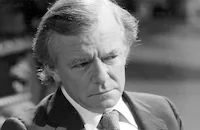No, My Darling Daughter!

Brief Synopsis
Cast & Crew
Ralph Thomas
Michael Redgrave
Michael Craig
Roger Livesey
Rad Fulton
Juliet Mills
Film Details
Technical Specs

Synopsis
Business tycoon Sir Mathew Carr withdraws his daughter Tansy from her British high school so that she can complete her education at a Paris finishing school. Tansy, who is most happy at home playing hockey and cricket, resists her father's plan. She meets Cornelius, an American boy whose father is a business associate of Sir Mathew's, and they discover that they have much in common. Cornelius neglects to deliver a letter from his father to Sir Mathew, and Tansy's father is compelled to fly to New York. In his absence, Sir Mathew sends Tansy fishing in Scotland with his friend General Barclay. Cornelius follows them, and he and Tansy go off camping, prompting newspaper headlines about their supposed elopement. General Barclay's son, Thomas, finds Tansy and returns her to Sir Mathew, who, upon discovering the boy's identity, agrees to let her marry Cornelius. Thomas and Tansy fall in love, however, thus interrupting the wedding plans. Tansy elopes with Thomas to Scotland, to the delight of Sir Mathew and General Barclay.

Director
Ralph Thomas
Cast

Michael Redgrave
Michael Craig
Roger Livesey
Rad Fulton

Juliet Mills
Renee Houston

Joan Sims
Carole Shelley

Peter Barkworth
David Lodge
Victor Brooks
Court Benson
Ian Fleming
Terry Scott
Crew
Bill Alexander
Pat Baden
James Bawden
Harry Black
Betty E. Box
Betty E. Box
Yvonne Caffin
Maurice Carter
Margaret Child
Nigel Curzon
J. W. N. Daniel
Bert Davey
Tommy Gleed
Gladys Goldsmith
Rhonda Grogan
Reg Hall
Harry Hannay
Frank Harvey
John Hilling
Stanley Hosgood
Ian Jeayes
Bert Jempson
Simon Kaye
Herbert Kretzmer
David Lee
Gordon K. Mccallum
Dudley Messenger
John Morgan
Charles Orme
Norrie Paramor
William Partleton
Alfred Roome
Don Sharpe
Betty Sherriff
Earl St. John
Ernest Steward
Arthur Taksen
Ralph Thomas
Donald Toms
Anthony Waye
Ken Wilkes

Videos
Movie Clip


Film Details
Technical Specs

Articles
No, My Darling Daughter
By Violet LeVoit

No, My Darling Daughter
Quotes
Trivia
Notes
Harold Brooke and Kay Bannerman's play, on which this film was based, was published under the title Don't Tell Father. The picture was released in Great Britain in 1961; running time: 97 min.

Miscellaneous Notes
Released in England August 1961
b&w
rtg BBFC U













